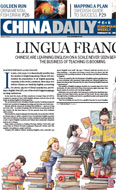Society
Thirst for class
Updated: 2011-03-02 07:46
By Shi Yingying (China Daily)
|
Wines are displayed at a Shanghai cellar. Yong Kai / China Daily |
More Chinese are taking to wine drinking and are seeking help to make informed choices. Shi Yingying reports.
Gradually, restaurants have been introducing wine lists with their menus, as convenience stores in cities such as Beijing and Shanghai have started stocking wine. It is clear that more Chinese are becoming wine lovers, including Lao Weiling, a logistics worker with a salary of less than 2,000 yuan ($304) per month.
"This 2007 Valpolicella Superiore Ripasso Monti Garbi will go perfectly with lamb shashlik," says the 59-year-old Shanghainese, pointing to a bottle of wine - newly imported from Italy's northern city of Verona by Shanghai wine cellar, Force 8.
Cozi Ge, the cellar's sales executive, who had invited Lao for a sample of the previous night's wine tasting, stands there open-mouthed at this precise evaluation.
"So what do you think about this 2006 Amarone Selezione Antonio Castagnedi?" asks Ge, pouring him a second glass.
"Venison should go well with it," says Lao, a 40-year veteran drinker of beer, baijiu (white liquor) and huangjiu (traditional Chinese grain spirits), but a newcomer to wine.
"He's right," Ge says. "The official recommendation for this wine is BBQ or cheese, but game meat such as venison is even more delicate."
Chinese wine drinkers, once regarded as young and gullible, are now becoming more savvy about wines.
In another corner of the city, wine educator and executive director of Yangjiu.com, Matthieu Liard, is holding his regular wine class for a diverse group of 15. This French native came to China four years ago and plunged into the wine business right away.
"My wine classes on Friday morning and night are getting too crowded. This kind of a class needs to be small and intimate, so I'm holding an extra class on Thursday night," Liard says. "More than 60 percent of my students are Chinese."
The young wine educator says more Chinese now drink wine because they like its taste, rather than just wanting to appear fashionable.
"A few years ago, people would say 'give me French wine'," he says. "But nowadays, the queries are more specific and people will often ask for recommendations."
Just a few years ago, wines from easily recognizable French regions such as Bordeaux and Burgundy were the ones sought after by the country's wine neophytes, a rapidly growing breed. An overpowering urge to keep up with a trend among the elite meant many got cheated out of hundreds, even thousands, of yuan.
"Distributors use the fact that wine is imported to slap on huge price margins," a staff member who wished to remain anonymous, at Shanghai's bureau of Ubifrance, the French trade commission, told the South China Morning Post.
Compounding the problem are misleading labels. "Wine distributors go to Bordeaux and buy wine in bulk for as little as $1 a bottle. They then put a fancy Chinese label on this and sell it in the mainland at upwards of $50 to $100 a bottle," says Dan Huang from Force 8.
But people continue to buy. According to Ubifrance, the nation now ranks eighth in the global wine market.
Wine China Exhibition says China imported at least 280 million liters of wine in 2010. The figure was 90 million liters in 2009 and 54 million liters in 2008, according to London-based market analyst International Wine and Spirits Research.
Reaping the rewards of red-hot development, newly-rich Chinese consumers are drinking more French wine than those from other countries.
"Chinese are now consuming more Chateau Lafite than where it is produced in France," says Tony Jiang from Shanghai Wine Club Association.
"There's always going to be a danger when people drink not out of passion for fine wines but because they think that is what they should be seen drinking," Jiang says. "Having drinkers who value the bottle more than wine quality will lead to an unhealthy market and the only way out is to make customers knowledgeable about wine."
In late December, China Europe International Business School (CEIBS) contacted Force 8's Dan Huang to organize a series of school reunion dinners based on the appreciation of fine wine.
"There are people who have been in a situation where they felt stupid because they didn't know anything about wine," says organizer Shen Zhaoling, a graduate from CEIBS, adding that most of the graduates hold management positions.
"I did a survey before organizing the dinner and found the top questions were: How to select wines for different occasions and how to select the right glasses to go with the wines?" Shen says.
Yangjiu.com's Liard holds tailor-made wine classes for company employees. "Companies usually get to choose the topic but the very basic 'Introduction to wine' is a popular one," he says.
Making an effort to learn about wines earned one young lady a promotion, according to Jiang who also holds wine classes to make more Chinese knowledgeable about wines.
"I have a student who was promoted from senior secretary to chief secretary because of her rich knowledge of red wines," Jiang says.
E-paper

Lingua franca
Chinese are learning English on a scale never seen before and the business of teaching is booming.
Preview of the coming issue
Golden run ahead
Looking abroad
Specials

NPC & CPPCC sessions
Lawmakers and political advisers gather in Beijing to discuss major issues.

Sentimental journey
Prince William and Kate Middleton returned to the place where they met and fell in love.

Rent your own island
Zhejiang Province charts plans to lease coastal islands for private investments

